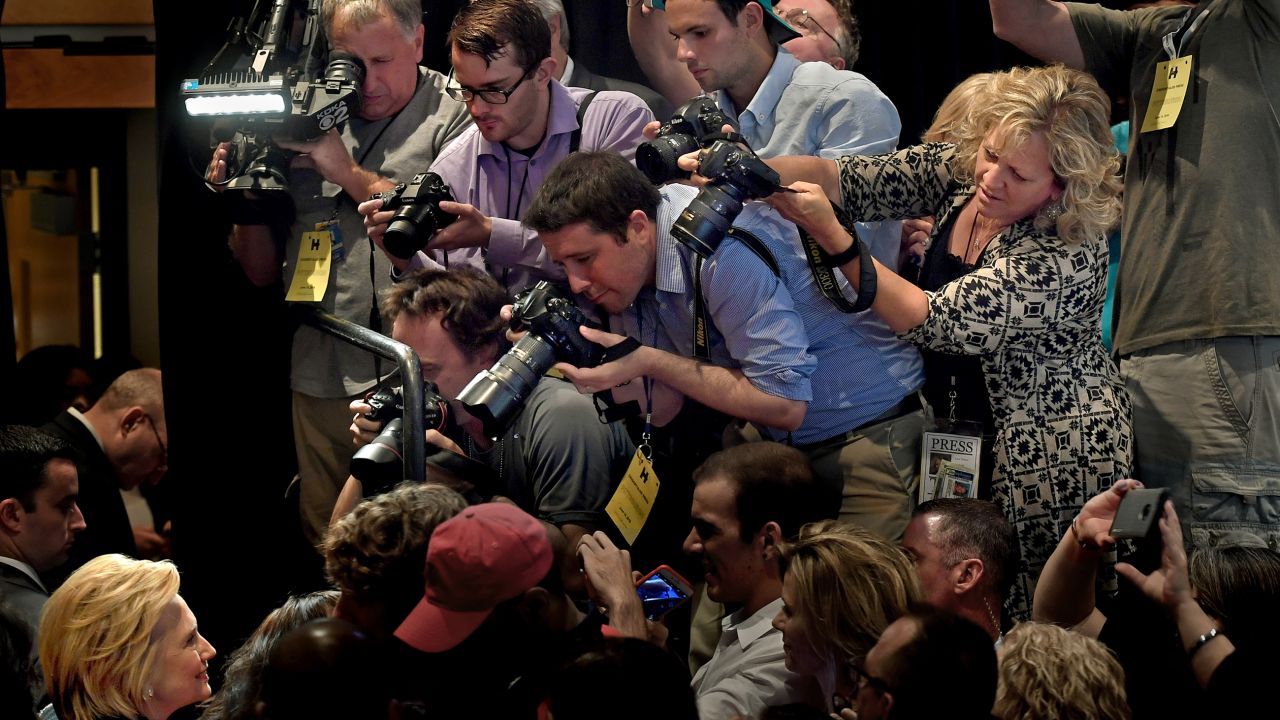
Photographers get into position to take photos of Hillary Clinton at the conclusion of her address at the International Brotherhood of Electrical Workers Local Union No. 5 in Pittsburgh on June 14, 2016. (Photo: Michael S. Williamson/The Washington Post via Getty Images)
With the cheerleading events known as the Republican National Convention and the Democratic National Convention behind us and about three months to go to Election Day, we asked readers for their thoughts on what the press could do to improve their coverage of the presidential campaign.
Hundreds of people offered their opinions on Facebook, with the most popular comment coming from Sarah Robertson Palmer. She writes: “Isn’t this question months too late? If they’d been doing their jobs at the beginning of the primaries, Bernie Sanders would be the Democratic nominee and someone other than Donald Trump would be the Republican. The press let the US down; way, way down.”
But others, like Laurie J. Batchelor, disagree and find it “disturbing” that people are blaming the media for the primary results. “Folks we are to blame,” Batchelor writes. “Many did not bother to gather the facts, many did not separate fact from opinion or fact from fiction… Many did not vote but now feel they have a right to criticize those who did. We have no one to blame but ourselves for where we are.”
Batchelor has a point. About 29 percent of estimated eligible voters cast a vote in the Republican and Democratic presidential primaries this year, according to Pew Research. For congressional primaries, the picture is even more grim, with only 14.6 percent of voters participating in 2014 — a record low, according to the Center for the Study of the American Electorate.
[Editor’s note: See Christopher Hass’ post at In These Times about why Sanders came up short in the primaries and Neal Gabler’s article for BillMoyers.com on the rise of Trump.]
Call Them Out
Overall, there were a lot of comments pushing the media to do “your job,” “stop trying to make this a reality show” and offer “unbiased” coverage. Many also believe the press could do a better job at reporting on the candidates’ lies. As Ann Solomon writes: “Call a lie a lie and don’t let it be ‘walked back,’ ‘misspeaking’ or ‘out of context.’” Interestingly, even after the press called out Trump this week for lying about a video he said he saw of a $400 million payment being unloaded from a US plane in Iran — he continued to repeat the claim, despite the fact that his campaign admitted he was incorrect. Today, he finally said he was wrong.
On a related issue, there is concern, as expressed by Lorrie Legg, that the press uses too many pundits. “The people listen to the pundits’ biased opinions and think what they say is true,” she says. For those interested in doing some legwork of their own, a number of websites fact-check candidate’s statements, as well as those of some pundits, including FactCheck.org, PolitiFact, The New York Times and The Washington Post.
A common wish among our readers is for the media to hold the candidates’ “feet to the fire,” as Delores Sylvester puts it. Journalism professors would be impressed by her sound advice to not only ask the hard questions but to know the answers. “This way if the candidate changes the subject or the answer is evaded, the reporter is ready with facts. If the question still is not answered, say so. If someone says something that is nuts, point that out.” An example is CNN’s Jake Tapper asking Trump if his comments about a judge in the Trump University case were racist and following up 23 times (!) until the GOP presidential candidate gave him a straight answer.
— Lana Miller Caywood
Others say the media must press the candidates to give specific, realistic plans on how they will achieve their agendas. Lana Miller Caywood says: “It’s time to stop giving free press for hurling insults and demand specifics on policy issues.”
Many say, as they have in the past, that the corporatization of the media is part of the problem, with just six companies controlling about 90 percent of media consumed by Americans, compared to 50 percent in 1983, according to The New York Times. Lee Stacie is searching for “reliable sources that aren’t beholden to anyone” and Susan Atkinson suggested the BBC (yes, a British outfit for news on American elections) and Bonita Anderson suggested PBS. Other recommended outlets include The Nation, The Washington Post, DemocracyNow, NPR and BillMoyers.com.
A number of people write that the nightly comedy programs, such as The Daily Show with Trevor Noah and Last Week Tonight with John Oliver, seem to be the best sources for news, as Chuck Deshaies writes. “They seem to be about the only reporters who get what is really going on across the US and are not afraid of making these flawed candidates squirm, as they should be!”
Think Local
Many agree with Stoliver Sloover’s comment that “there is never enough coverage of elections other than the presidential one.” Thomas Parton added that “big dark money is behind local elections and no one is paying attention.” He’s referring to the Koch brothers funding their prefered candidates in the 2016 House and Senate races in states like Nevada and Ohio, as well as state gubernatorial and state attorney general races. On campaign financing, Bruce Shaw says the press should determine who the candidate’s funders are and “confront them with any quid pro quos.”
Daniel Campbell suggests that America’s election season drags on way too long (who among us does not agree?) and believes we should follow the example of countries like France, where presidential campaigns generally last about two weeks. “If you cannot convince the population in that amount of time, you are not qualified,” Campbell writes.
We’ll just say amen to that. But if you agree or disagree with the comments by Campbell and others, we want to hear from you. Keep the conversation going here or on Facebook.




